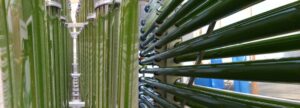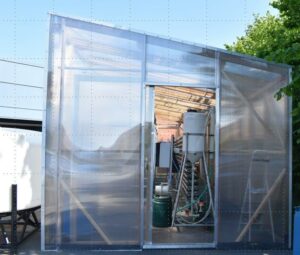Investment site 3 : General introduction and operation during COVID-19 crisis
The liquid fraction of digestate was collected from an anaerobic digestion (AD) plant in Pittem (20 km South of Oostkamp) that processes food and farm waste of plant-origin. The idea of using digestate of plant-origin was implemented to comply with the existing European legislations regarding use of digestate-grown biomass for animal feed application. The hygienization of digestate performed at the AD plant might also favor the use of bag (paper) filtration for the removal of large particles from digestate without the need of a further sterilization step. Paper filtration by either bag filter systems or conveyer belt filter systems is an adopted practice at industrial scale for treatment of liquid fractions and wastewaters. The mixed culture grew autotrophically with a good synergy among Chlorella sp. and Desmodesmus sp.. Similar microalgae species have been individually tested at ALG-AD Investment site 1 at Langage AD, Plymouth, UK.
The commissioning of the pilot facility with digestate as substrate was done in phases during mid-February to mid-March and, since then, the pilot has been operational. UGent researchers and staff from Innolab supervised the tasks of inoculation, bioreactor operation with regular sampling, quality control and harvesting. The first experiences with HR have been challenging due to bad weather conditions and later followed by the working restrictions laid due to the COVID-19 crisis. The restrictions reduced the involvement of UGent researchers at the pilot facility but a regular contact with the Innolab team was maintained. With necessary safety measurements in place, the Innolab team managed to keep both HR and VR running throughout the months of March – May. The follow-up of key performance indicators of the culture quality and microbiological contamination has been majorly impacted due to very limited access of labs at UGent and once-a-month visit to Innolab.
Luckily, the used microalgae cultures are so robust that they could survive the tough growth conditions and restricted involvement of staff during the COVID-19 crisis. For sure, optimum operation and maintenance would definitely enhance the result obtained, but we were very pleased to reach a good concentration of healthy cells already in the preliminary runs. The first harvest of the biomass from HR was done with the help of an external company via centrifugation to produce an algae paste. This paste will be used by ALG-AD WP 2 partners for further experimentation for animal feed trials. In all, a good learning experience! Now, the Investment site 3 team is gearing up for the summer time and hoping for more positive results due to better availability of light and warm weather.

